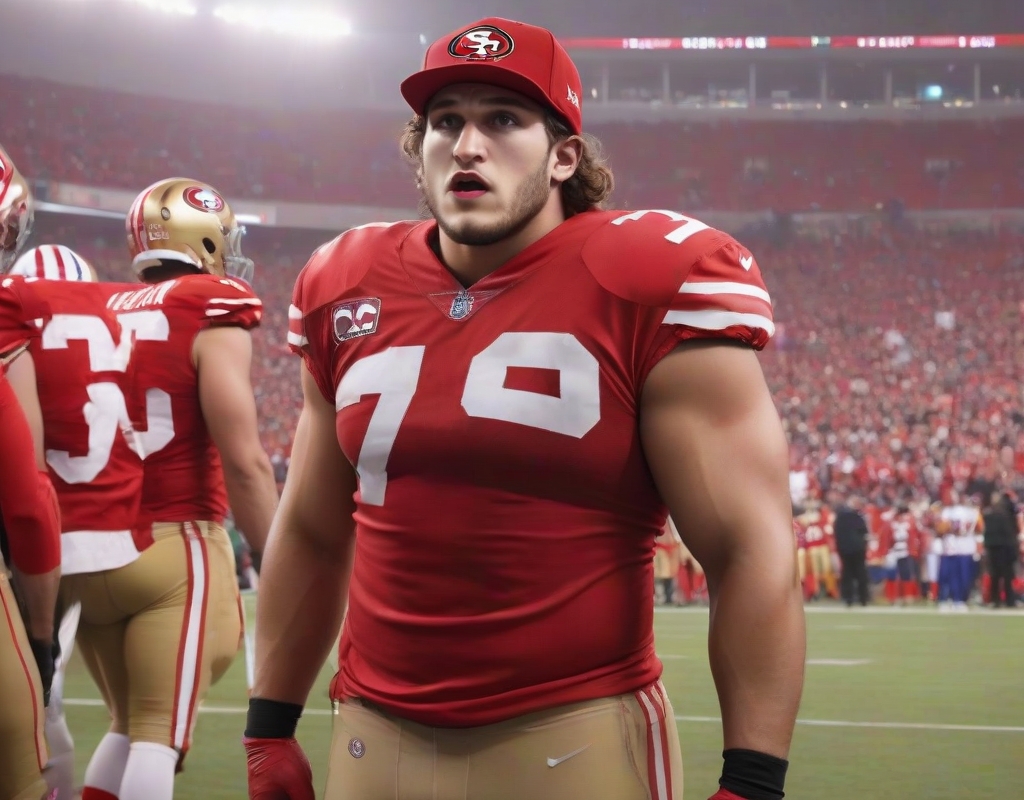Nick Bosa, the celebrated defensive lineman for the San Francisco 49ers, recently captivated public attention not for his athletic prowess, but for a controversial political statement made off the field. By choosing to wear a “Make America Great Again” hat following a game, Bosa found himself in the crosshairs of a heated debate on the intersection of sports and political expression. This act resulted in a significant fine of $11,000 imposed by the National Football League, rekindling discussions about the appropriateness of political displays within professional sports.
The NFL, a body that promotes political neutrality in its games, interpreted Bosa’s display as a challenge to this stance. Its regulations aim to safeguard the sportsmanship spirit of the game while also avoiding the alienation of fans with differing political views. The core controversy surrounding Bosa’s fine revolves around balancing an athlete’s personal freedoms against the league’s rules intended to keep the focus firmly on sports rather than sociopolitical issues.
Historically, the NFL’s relationship with athlete political activism has been tenuous. Colin Kaepernick’s 2016 national anthem protest against racial injustices sparked national discourse and led to a broader re-evaluation of athletes’ roles beyond their sports disciplines. Following such instances, the NFL has honed its policies to discourage overt political endorsements during game-related events in an attempt to maintain a neutral environment.
The repercussion of Bosa’s fine has been diverse and profound. Many fans and commentators argue that the penalty encroaches on freedom of speech, suggesting the NFL’s regulations might be overly stringent. Bosa himself defended his actions with a statement emphasizing his right to personal expression. His stance reflected a growing sentiment among athletes who feel empowered to use their platforms for personal viewpoints, despite the potential for organizational conflict.
Legal and sports experts, nationwide, weigh in on this ongoing conversation. A sports law professor emphasized the delicate balance athletes must maintain between their personal beliefs and their responsibilities as public figures under contract in a professional league. This case hence highlights broader questions about freedom of speech within employer-employee dynamics in highly visible arenas.
Future implications of Bosa’s fine may set precedents for how other sports bodies manage similar controversies. It specifies the growing pattern of how political expressions, even subtle ones, are perceived and managed in professional settings.
The broader societal and cultural contexts cannot be ignored in discussing this incident. Sports have long been arenas not just for games but also for significant sociocultural dialogues. From Muhammad Ali’s anti-war declarations in the 1960s to the widespread professional athlete support for the Black Lives Matter movement in recent years, the sports world mirrors societal tensions and transformations.
This observation extends beyond American football or even U.S. borders. Notable international athletes like Giannis Antetokounmpo have similarly commented on the unique position athletes hold, influencing widespread audiences across different cultures while adhering to their profession’s demands.
Conclusively, the issue surrounding Nick Bosa is more than a matter of disciplinary action for a dress code violation. It speaks volumes about the ongoing negotiation between personal liberties and professional obligations that athletes navigate. Such instances serve as crucial points of reflection for sports governing bodies and athletes, potentially guiding future interactions and policies.
As the discourse evolves, the equilibrium between personal expression and professional conduct in sports will likely become clearer, helping outline better frameworks for athlete and organizational interactions. Nick Bosa’s situation remains a pivotal reference as this dialogue progresses, marking a complex chapter in the narrative of sports as a conduit for broader political and societal conversations.




